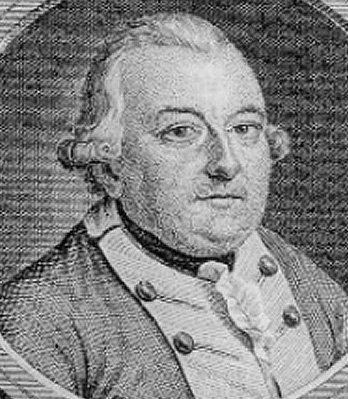| Profile | Major Works | Resources |
Jacob Mauvillon, 1743–1794

German military engineer, historian and Physiocrat.
Born in Leipzig, Jakob Eléazar Mauvillon descende from a family of French Huguenot refugees in Saxony. Bent on a military career, Jakob Mauvillon attempted to enlist in the Hanoverian army, but was consistently rejected on account of his diminutive height and frail constitution. Persisting, he was at length admitted into the corps of engineers. He went on to secure an appointment teaching engineering and military science, first in the military collegium of Cassel at 1771, achieving the rank of captain in the corps in 1777. He subsequently moved to the Collegium Carolinium in Brunswick in 1784, eventually reaching the rank of lieutenant-colonel.
Mauvillon's interest in economics emerged via his translations of French texts, notably Abbé Raynal's Histoire des deux Indes in 1774 and then Jacques Turgot's Reflexions in 1775. Converted to Physiocracy, Mauvillon went on to produce his own summary of the doctrine in an essay in his Sammlung von Aufsätzen (1776, a collection of translated economic essays, e.g. Tucker). Mauvillon's essay contains the probably the first use of the term 'Physiocrat' to refer to a follower of Quesnay's doctrines (the word physiocratie had been, of course, used earlier as a title by Dupont de Nemours, not the identifiers 'physiocrat' or 'physiocratic' for the sect).
Mauvillon's essay provoked a response by his Cassel colleague C.W. Dohm, a cameralist and vigorous opponent of the new doctrine, which opened up a wider debate on Physiocracy in German circles. Mauvillon composed a rejoinder to Dohm in his Physiocratische Briefe (1780) containing one of the better German restatements of the theory. Other participants in the Mauvillon debate include Fürstenau (1778), Springer (1780) in defense of physiocracy, with Pfeiffer (1780) against it, and Georg Andreas Will taking an intermediary position.
In 1788, Mauvillon ghost-authored the bulk of De la monarchie Prussiene, normally attributed to the younger Comte de Mirabeau (son of the Physiocrat), with whom Mauvillon had struck up a friendship.
|
Major Works of Jacob Mauvillon
|
|
HET
|
|
Resources on Jacob Mauvillon
|
All rights reserved, Gonçalo L. Fonseca
